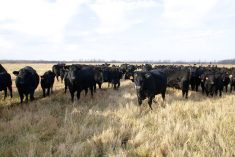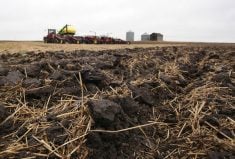Yet another company has thrown its weight behind regenerative agriculture.
This morning, PepsiCo said it wants to spread the adoption of regenerative agriculture to seven million acres by 2030.
The seven million acres will be equal to the farmland, around the world, used to “grow crops and ingredients for the company’s products”, PepsiCo said in a statement.
With more than $70 billion in annual sales of potato chips, oatmeal, orange juice, soda and snack foods, Pepsi is a major buyer of potatoes, oats, corn and oranges.
Read Also

Farming Smarter receives financial boost from Alberta government for potato research
Farming Smarter near Lethbridge got a boost to its research equipment, thanks to the Alberta government’s increase in funding for research associations.
Its regenerative ag commitment is part of Pepsi’s Positive Agriculture agenda, which has five key goals: build soil health and fertility, sequester carbon and reduce emissions, improve watershed health, increase biodiversity and improve farmer livelihoods.
“We know we have to do even more to create truly systemic change,” said Jim Andrew, the company’s chief sustainability officer.
“By focusing on regenerative agriculture practices at the local level to improve soil health, we can build a stronger foundation for our products and help make the entire food system more sustainable.”
Regenerative agriculture is hard to define, but it can be described as a system that reduces the need for fertilizer, pesticides and other crop inputs by employing practices that improve soil health. Those practices include the use of cover crops, reduced tillage, livestock integration and diverse crop rotations.
In the last couple of years, major food and agri-food companies have publicly committed to regenerative agriculture. Last fall, Cargill said it wants to see regenerative ag practised on 10 million acres of North American farmland by 2030.
Two years ago, in March 2019, General Mills said it supports cover crops, reduced tillage and other regenerative ag practices. It set a goal of one million acres by 2030.
The maker of Cheerios and Nature Valley granola bars is a major buyer of oats and has been working with about 50 oat growers in Manitoba and Saskatchewan, helping them adopt practices that improve soil health and reduce greenhouse gas emissions.
Regenerative ag may be better for the environment, but increasing organic carbon in the soil and making farmland more resilient should also be good for farmers. It could help them cope with droughts and other extreme weather.
General Mills purchases most of its oats from three growing regions: southern Manitoba, central North Dakota and northeastern Saskatchewan. If one of those areas had a drought or another production issue, General Mills could be short on oats.
“We feel improving soil health can help reduce… those large variable swings in supply,” Tom Rabaey, a General Mills agronomist, said in 2019.
For PepsiCo, pushing farmers to improve soil health and sequester more carbon is part of a broader goal of reducing its environmental footprint.
It plans to cut greenhouse gas emissions across its “value chain” by 40 percent by 2030.
Pepsi has a goal of net-zero emissions by 2040 and has developed a tagline for its Positive Agriculture plan: “Healthy soil grows sustainable ingredients, which improve livelihoods.”
Contact robert.arnason@producer.com


















